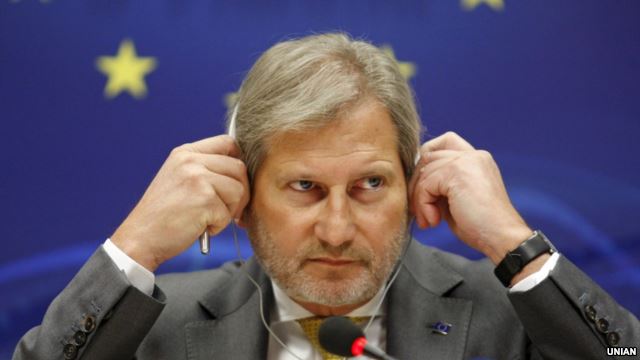EU: Hahn confident on Ukraine, Georgia visa liberalization in 2016
| Publisher | Radio Free Europe/Radio Liberty |
| Publication Date | 3 September 2016 |
| Cite as | Radio Free Europe/Radio Liberty, EU: Hahn confident on Ukraine, Georgia visa liberalization in 2016, 3 September 2016, available at: http://www.refworld.org/docid/57db9a8513.html [accessed 21 September 2016] |
| Disclaimer | This is not a UNHCR publication. UNHCR is not responsible for, nor does it necessarily endorse, its content. Any views expressed are solely those of the author or publisher and do not necessarily reflect those of UNHCR, the United Nations or its Member States. |
September 03, 2016
 EU enlargement commissioner Johannes Hahn (file photo)
EU enlargement commissioner Johannes Hahn (file photo)
BRATISLAVA – EU enlargement commissioner Johannes Hahn said on September 3 that there will be a decision in both the European Parliament and among EU member states to grant visa liberalization to Ukraine and Georgia later this year.
Speaking to RFE/RL at a meeting among EU foreign ministers in Bratislava on September 2 and September 3, Hahn noted that "among member states there was a clear indication and by many of the member states a clear expectation that both countries should get it."
Both the European Parliament and the council must give green light to visa liberalization and EU sources that RFE/RL has spoken to believe that this will happen with both countries in October or November and that citizens will be able to travel to the EU's Schengen zone without visas later this winter.
Earlier in the summer, Germany blocked a decision to grant Georgia visa liberalization, with reports claiming that Berlin feared a spike of crimes committed by Georgians in Germany.
Hahn however believes that the creation later this autumn of a beefed up EU mechanism suspending visas in case of problems "should remove all concerns."
On visa liberalization for Kosovo, the commissioner was less confident stating that the "timing was unclear" and was dependent on finding solutions to a border dispute with Montenegro and building up a track record in fighting organized crime.
Link to original story on RFE/RL website
